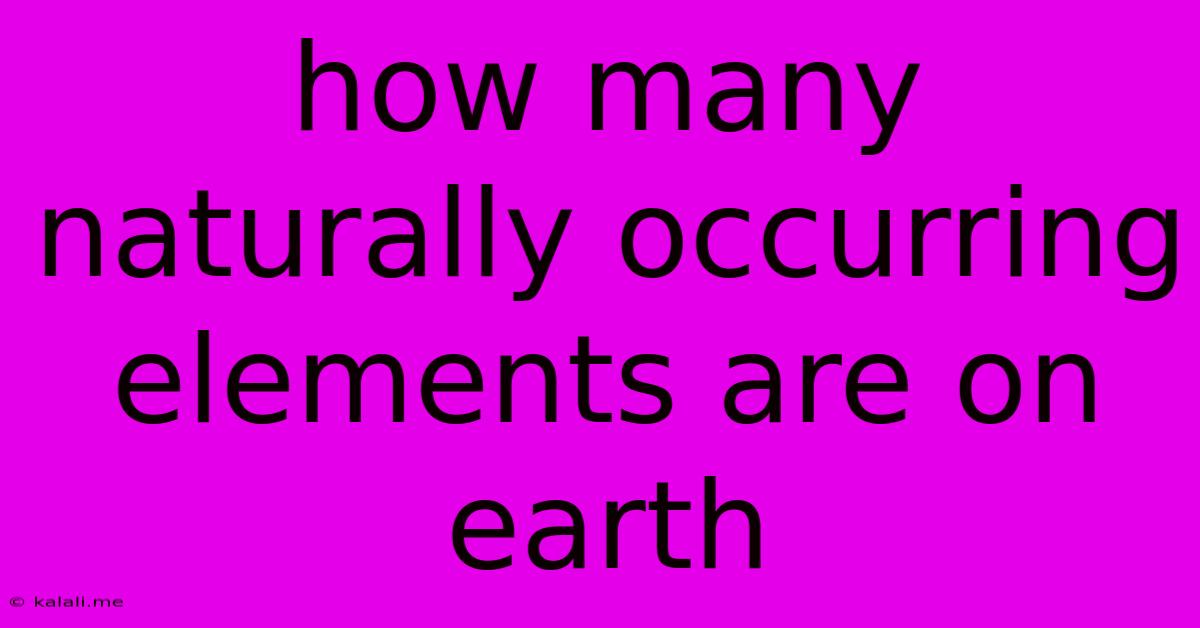How Many Naturally Occurring Elements Are On Earth
Kalali
Jun 15, 2025 · 3 min read

Table of Contents
How Many Naturally Occurring Elements Are on Earth? A Deep Dive into the Periodic Table
The Earth is a treasure trove of elements, the fundamental building blocks of all matter. But how many of these elements naturally exist on our planet? This question delves into the fascinating world of chemistry and geology, revealing a surprisingly precise answer. Understanding the number of naturally occurring elements helps us appreciate the complexity and diversity of our world, from the smallest atom to the largest mountain range.
While the periodic table boasts over 118 elements, not all of them are found naturally on Earth. Some are synthetically created in laboratories, the result of complex scientific processes. So, how many elements grace our planet in their natural, unadulterated form? The answer is 94.
This number, 94, encompasses all the elements from hydrogen (the lightest element) to plutonium (a radioactive element). These 94 elements exist in varying abundances, with some being incredibly common (like oxygen and silicon, forming the bulk of the Earth's crust) and others extremely rare, found only in trace amounts in specific geological locations.
The Distribution of Naturally Occurring Elements: A Look at Abundance
The distribution of these 94 elements isn't uniform. Some are ubiquitous, while others are exceedingly rare. This uneven distribution stems from various factors including the conditions of the Earth's formation, radioactive decay, and geological processes.
-
Abundant Elements: Oxygen, silicon, aluminum, iron, calcium, sodium, potassium, and magnesium together make up over 99% of the Earth's crust. These elements are the main components of rocks, minerals, and soil.
-
Rare Earth Elements (REEs): These elements, including scandium, yttrium, and the lanthanides, are less abundant but crucial for modern technologies such as smartphones, electric vehicles, and wind turbines. Their rarity makes them valuable and strategically important resources.
-
Trace Elements: Many elements exist in minuscule quantities, but even these trace elements play vital roles in biological processes and geological formations.
The Role of Radioactive Decay
The naturally occurring elements also include several radioactive isotopes, which undergo decay over time, transforming into different elements. This radioactive decay is a crucial process in shaping the Earth's geology and influencing the abundance of specific elements. Uranium and thorium are prime examples of naturally occurring radioactive elements that contribute to the planet's internal heat.
Beyond the 94: Synthetic Elements
While 94 elements occur naturally, scientists have created many more in laboratories through nuclear reactions. These synthetic elements, however, are not found in nature and are typically short-lived, decaying rapidly into other elements. Their creation pushes the boundaries of our understanding of atomic structure and nuclear physics.
Conclusion: A Dynamic and Ever-Changing Inventory
The number 94, while representing the naturally occurring elements present on Earth today, should be viewed as a snapshot in time. Geological processes and radioactive decay are constantly reshaping the elemental landscape. The study of these elements, their distribution, and their interactions continues to provide valuable insights into the Earth's history, its composition, and the processes that govern our planet. This knowledge is crucial for understanding resource management, environmental science, and technological advancements.
Latest Posts
Latest Posts
-
The Most Abundant Molecule In The Cell Is
Jun 15, 2025
-
What Is The Multiples Of 50
Jun 15, 2025
-
Which Of The Following Are Not Antioxidants
Jun 15, 2025
-
Act Score For Western Michigan University
Jun 15, 2025
-
What Is The Difference Between Prose And Verse
Jun 15, 2025
Related Post
Thank you for visiting our website which covers about How Many Naturally Occurring Elements Are On Earth . We hope the information provided has been useful to you. Feel free to contact us if you have any questions or need further assistance. See you next time and don't miss to bookmark.